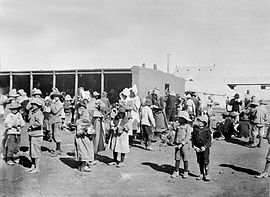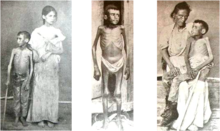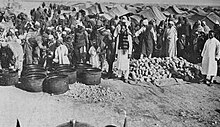
| Part of a series on |
| Discrimination |
|---|
 |
Internment is the imprisonment of people, commonly in large groups, without charges[1] or intent to file charges.[2] The term is especially used for the confinement "of enemy citizens in wartime or of terrorism suspects".[3] Thus, while it can simply mean imprisonment, it tends to refer to preventive confinement rather than confinement after having been convicted of some crime. Use of these terms is subject to debate and political sensitivities.[4] The word internment is also occasionally used to describe a neutral country's practice of detaining belligerent armed forces and equipment on its territory during times of war, under the Hague Convention of 1907.[5]
Interned persons may be held in prisons or in facilities known as internment camps (also known as concentration camps). The term concentration camp originates from the Spanish–Cuban Ten Years' War when Spanish forces detained Cuban civilians in camps in order to more easily combat guerrilla forces. Over the following decades the British during the Second Boer War and the Americans during the Philippine–American War also used concentration camps.
The term "concentration camp" and "internment camp" are used to refer to a variety of systems that greatly differ in their severity, mortality rate, and architecture; their defining characteristic is that inmates are held outside the rule of law.[6] Extermination camps or death camps, whose primary purpose is killing, are also imprecisely referred to as "concentration camps".[7]
The Universal Declaration of Human Rights restricts the use of internment, with Article 9 stating, "No one shall be subjected to arbitrary arrest, detention or exile."[8]
Defining internment and concentration camp




The American Heritage Dictionary defines the term concentration camp as: "A camp where persons are confined, usually without hearings and typically under harsh conditions, often as a result of their membership in a group which the government has identified as dangerous or undesirable."[9]
Although the first example of civilian internment may date as far back as the 1830s,[10] the English term concentration camp was first used in order to refer to the reconcentration camps (Spanish:reconcentrados) which were set up by the Spanish military in Cuba during the Ten Years' War (1868–1878).[11][12] The label was applied yet again to camps set up by the United States during the Philippine–American War (1899–1902).[13] And expanded usage of the concentration camp label continued, when the British set up camps during the Second Boer War (1899–1902) in South Africa for interning Boers during the same time period.[11][14]
During the 20th century, the arbitrary internment of civilians by the state reached its most extreme forms in the Soviet Gulag system of concentration camps (1918–1991)[15] and the Nazi concentration camps (1933–1945). The Soviet system was the first applied by a government on its own citizens.[12] The Gulag consisted in over 30,000 camps for most of its existence (1918–1991) and detained some 18 million from 1929 until 1953,[15] which is only a third of its 73-year lifespan. The Nazi concentration camp system was extensive, with as many as 15,000 camps[16] and at least 715,000 simultaneous internees.[17] The total number of casualties in these camps is difficult to determine, but the deliberate policy of extermination through labor in many of the camps was designed to ensure that the inmates would die of starvation, untreated disease and summary executions within set periods of time.[18] Moreover, Nazi Germany established six extermination camps, specifically designed to kill millions of people, primarily by gassing.[19][20]
As a result, the term "concentration camp" is sometimes conflated with the concept of an "extermination camp" and historians debate whether the term "concentration camp" or the term "internment camp" should be used to describe other examples of civilian internment.[4]
The former label continues to see expanded use for cases post-World War II, for instance in relation to British camps in Kenya during the Mau Mau rebellion (1952–1960),[21][22] and camps set up in Chile during the military dictatorship of Augusto Pinochet (1973–1990).[23] According to the United States Department of Defense as many as 3 million Uyghurs and members of other Muslim minority groups are being held in China's re-education camps which are located in the Xinjiang region and which American news reports often label as concentration camps.[24][25] The camps were established in the late 2010s under General Secretary Xi Jinping's administration.[26][27]
Impact
Scholars have debated the efficacy of internment as a counterinsurgency tactic. A 2023 study found that internment during the Irish war of independence led to greater grievances among Irish rebels and led them to fight longer in the war.[28]
Examples
Active
- North Korean prison camps (1948–present)[29][30]
- Guantanamo Bay detention camp (2002–present)[31][32]
- Refugee detention centres in Libya (2011–present)[33][34][35][36][37]
- Uyghur re-education camps in China (2017–present)[38][39]
- Anti-gay detention camps in Chechnya (2017–present)[40][41][42][43]
- Migrant detentions as part of immigration detention in the United States (2018–present)[44][45][46][47]
- Internment camps in Ethiopia during the Tigray War and the War in Amhara (2020–present).[48][49][50][51]
- Russian filtration camps in Ukraine during the Russian invasion of Ukraine (2022–present)[52][53][54]
- Sde Teiman detention camp in Israel during the Israel–Hamas war (2024–present)
Closed
- Abercorn Barracks, Northern Ireland (sometimes referred to as Ballykinlar Barracks) (1919–1921) (1971)
- Reconcentration policy during Cuba's War of Independence from Spain (1896–1898)
- Second Boer War in South Africa (1900–1902)
- Curragh Camp in Ireland (1939–46 & 1957–59). Curragh Camp was by far the largest, at least 30 other prisons and camps were used throughout the country.[55]
- Cyprus internment camps (1946–1949)
- Reconcentrados "Zones of Protection" 1901, Philippine-American War
- Herero and Namaqua genocide (1904–1907)
- Concentration of Armenians during the Armenian Genocide (1915–1916)
- Finnish Civil War (1918)
- Frongoch internment camp British camp used for WWI and Irish 1916 Easter Rising prisoners
- Gormanston Camp in the Irish Free State (1922–1923)
- Malayan New villages as part of the Briggs Plan during the Malayan Emergency (1950–1960)
- Italian concentration camps in Africa and Europe (1930–1944)
- HM Prison Maze in Northern Ireland (1971–75), previously known as Long Kesh Detention Centre, and known colloquially as the Maze or H-Blocks)
- German concentration camps before and during World War II (1933–1945)
- Japanese internment of prisoners of war and civilians during World War II (ended 1945)
- Japanese-American internment camps in World War II (1942–1946)
- Japanese Canadian internment (1942–1949)
- Deoli internment camp in India (1962–1967)
- Omarska camp in Bosnia, 1992
- Dretelj camp (1992–1995)
- Camp Bucca in Iraq (2003–2009)[56][57][58]
- Abu Ghraib prison in Iraq (1980–2014)[59][60][61]
See also
- Civilian internee
- Extermination through labor
- Extrajudicial detention
- Gulag
- New village
- Bantustan
- House arrest
- Labor camp
- Kwalliso (North Korean political penal labour colonies)
- Laogai (Chinese, "reform through labor")
- Military Units to Aid Production
- "Polish death camp" controversy
- Prison overcrowding
- Prisoner-of-war camp
- Prisons in North Korea
- Quasi-criminal
- Reductions – Spanish colonial settlements for relocation and Christianization of natives
- Re-education camp (Vietnam)
- Re-education through labor
- Remand (detention)
References
- ^ Lowry, David (1976). "Human Rights Vol. 5, No. 3 "INTERNMENT: DENTENTION WITHOUT TRIAL IN NORTHERN IRELAND"". Human Rights. 5 (3). American Bar Association: ABA Publishing: 261–331. JSTOR 27879033.
The essence of internment lies in incarceration without charge or trial.
- ^ Kenney, Padraic (2017). Dance in Chains: Political Imprisonment in the Modern World. Oxford University Press. p. 47. ISBN 978-0-19-937574-5.
A formal arrest usually comes with a charge, but many regimes employed internment (that is, detention without intent to file charges
- ^ "the definition of internment". www.dictionary.com.
- ^ a b Schumacher-Matos, Edward; Grisham, Lori (10 February 2012). "Euphemisms, Concentration Camps And The Japanese Internment". npr.org.
- ^ "The Second Hague Convention, 1907". Yale.edu. Archived from the original on 19 October 2012. Retrieved 1 February 2013.
- ^ Stone, Dan (2015). Concentration Camps: A Very Short Introduction. Oxford University Press. pp. 122–123. ISBN 978-0-19-879070-9.
Concentration camps throughout the twentieth and twenty-first centuries are by no means all the same, with respect either to the degree of violence that characterizes them or the extent to which their inmates are abandoned by the authorities... The crucial characteristic of a concentration camp is not whether it has barbed wire, fences, or watchtowers; it is, rather, the gathering of civilians, defined by a regime as de facto 'enemies', in order to hold them against their will without charge in a place where the rule of law has been suspended.
- ^ "Nazi Camps". United States Holocaust Memorial Museum. Retrieved 3 October 2020.
- ^ Universal Declaration of Human Rights, Article 9, United Nations
- ^ "Concentration camp". American Heritage Dictionary. Retrieved 22 July 2014.
- ^ James L. Dickerson (2010). Inside America's Concentration Camps: Two Centuries of Internment and Torture. Chicago Review Press. p. 29. ISBN 978-1-55652-806-4.
- ^ a b The Columbia Encyclopedia: Concentration Camp (Sixth ed.). Columbia University Press. 2008.
- ^ a b "Concentration Camps Existed Long Before Auschwitz". Smithsonian. 2 November 2017.
- ^ Storey, Moorfield; Codman, Julian (1902). Secretary Root's record. "Marked severities" in Philippine warfare. An analysis of the law and facts bearing on the action and utterances of President Roosevelt and Secretary Root. Boston: George H. Ellis Company. pp. 89–95.
- ^ "Documents re camps in Boer War". sul.stanford.edu. Archived from the original on 9 June 2007.
- ^ a b "Gulag: A History, by Anne Applebaum (Doubleday)". The Pulitzer Prizes. 2004. Retrieved 13 November 2019.
- ^ "Concentration Camp Listing". Belgium: Editions Kritak.
Sourced from Van Eck, Ludo Le livre des Camps
and Gilbert, Martin (1993). Atlas of the Holocaust. New York: William Morrow. ISBN 0-688-12364-3.. In this online site are the names of 149 camps and 814 subcamps, organized by country. - ^ Evans, Richard J. (2005). The Third Reich in Power. New York: Penguin Group. ISBN 978-0-14-303790-3.
- ^ Marek Przybyszewski. IBH Opracowania – Działdowo jako centrum administracyjne ziemi sasińskiej [Działdowo as the centre of local administration] (in Polish). Archived from the original on 22 October 2010 – via Internet Archive.
- ^ Robert Gellately; Nathan Stoltzfus (2001). Social Outsiders in Nazi Germany. Princeton University Press. p. 216. ISBN 978-0-691-08684-2.
- ^ Anne Applebaum (18 October 2001). "A History of Horror| Review of Le Siècle des camps by Joël Kotek and Pierre Rigoulot". The New York Review of Books.
- ^ "Museum of British Colonialism releases online 3D models of British concentration camps in Kenya". Morning Star. 27 August 2019.
- ^ "The Mau Mau Rebellion". The Washington Post. 31 December 1989.
- ^ "Chilean coup: 40 years ago I watched Pinochet crush a democratic dream". The Guardian. 7 September 2013.
- ^ "As the U.S. Targets China's 'Concentration Camps', Xinjiang's Human Rights Crisis is Only Getting Worse". Newsweek. 22 May 2019.
- ^ "Uighurs and their supporters decry Chinese 'concentration camps', 'genocide' after Xinjiang documents leaked". The Washington Post. 17 November 2019.
- ^ Ramzy, Austin; Buckley, Chris (16 November 2019). "'Absolutely No Mercy': Leaked Files Expose How China Organized Mass Detentions of Muslims". The New York Times. ISSN 0362-4331. Retrieved 16 November 2019.
- ^ Kate O'Keeffe and Katy Stech Ferek (14 November 2019). "Stop Calling China's Xi Jinping 'President', U.S. Panel Says". The Wall Street Journal.
- ^ Huff, Connor (2023). "Counterinsurgency Tactics, Rebel Grievances, and Who Keeps Fighting". American Political Science Review. 118: 475–480. doi:10.1017/S0003055423000059. ISSN 0003-0554.
- ^ "Life inside a North Korea labour camp: 'We were forced to throw rocks at a man being hanged'". The Independent. 28 September 2017.
- ^ "Political Prison Camps in North Korea Today" (PDF). 19 October 2013. Archived from the original (PDF) on 19 October 2013. Retrieved 18 December 2019.
- ^ Leigh, David (25 April 2011). "Guantánamo Bay files: Torture gets results, US military insists". The Guardian. ISSN 0261-3077. Retrieved 18 December 2019.
- ^ "Professor David Isaacs Speech" (PDF).
- ^ EXCLUSIVE: Italian doctor laments Libya's 'concentration camps' for migrants, archived from the original on 30 October 2021, retrieved 18 December 2019
- ^ "Europe's apathy toward humanitarian rescue outrages NGOs". InfoMigrants. 11 December 2018. Retrieved 18 December 2019.
- ^ Wehrey, Frederic (25 November 2019). "What the 'Danish Lawrence' Learned in Libya (5th paragraph from the last one)". The New York Review of Books. Retrieved 18 December 2019.
- ^ "Detained migrants killed in Libya airstrike used as 'human shields'".
- ^ Mediapart, La Rédaction De (2 December 2019). "France cancels speedboats delivery to Libyan coastguard". Mediapart. Retrieved 18 December 2019.
- ^ "China is creating concentration camps in Xinjiang. Here's how we hold it accountable". The Washington Post. 24 November 2018.
- ^ "Saudi crown prince defends China's right to put Uighur Muslims in concentration camps". The Daily Telegraph. 22 February 2019. Archived from the original on 11 January 2022.
- ^ "The persecution of gay men in Chechnya has chilling similarities to the Third Reich". NewsComAu. 19 April 2017. Retrieved 17 December 2019.
- ^ Stefanello, Viola (15 January 2019). "Is there a 'gay purge' in Chechnya? Rights group fears the worst". euronews. Retrieved 17 December 2019.
- ^ "Report: Chechnya Opens 'Concentration Camp for Homosexuals'". Snopes.com. 11 April 2017. Retrieved 17 December 2019.
- ^ "Question to the EU Commission by Matt Carthy" (PDF).
- ^ Ramirez, Fernando (14 June 2018). "Movement to call migrant detention centers 'concentration camps' swells online". Chron.
The practice of separating migrant families began in April when Attorney General Jeff Sessions announced a new "zero-tolerance" policy prosecuting 100 percent of illegal border crossings.
- ^ Hignett, Katherine (24 June 2019). "Academics rally behind Alexandria Ocasio-Cortez over concentration camp comments: 'She is completely historically accurate'". Newsweek. Retrieved 23 August 2019.
- ^ Holmes, Jack (13 June 2019). "An Expert on Concentration Camps Says That's Exactly What the U.S. Is Running at the Border". Esquire. Retrieved 3 July 2019.
- ^ Beorn, Waitman Wade (20 June 2018). "Yes, you can call the border centers 'concentration camps,' but apply the history with care". The Washington Post. Retrieved 30 August 2019.
- ^ Jonathan Hutson (25 September 2021). "Eyewitness accounts, video confirm reports of Tigrayan children held in concentration camp". Salon.com. Wikidata Q125771844. Archived from the original on 2 May 2024.
- ^ Lucy Kassa (7 November 2021). "'They just vanished': Tigrayans disappear for months in secret Ethiopian detention camps". The Globe and Mail. ISSN 0319-0714. Wikidata Q125771289. Archived from the original on 2 May 2024.
- ^ Clark, Helen; Lapsley, Michael; Alton, David (26 November 2021). "The warning signs are there for genocide in Ethiopia – the world must act to prevent it". The Guardian. Archived from the original on 27 November 2021. Retrieved 27 November 2021.
- ^ The Silent Suffering of the Amhara People in Ethiopia, European Centre for Law and Justice, April 2024, Wikidata Q125791341, archived from the original on 4 May 2024
- ^ https://www.msn.com/en-gb/news/world/thousands-of-mariupol-survivors-being-detained-and-e2-80-98tortured-e2-80-99-in-russia-controlled-prisons-in-occupied-ukraine/ar-AAXrRjm
- ^ "'You can't imagine the conditions' - Accounts emerge of Russian detention camps". 25 April 2022. Retrieved 29 May 2024.
- ^ https://en.interfax.com.ua/news/general/831791.html
- ^ Civil War Internment Collection (Report). Defense Forces of Ireland. 2017. Retrieved 22 May 2024.
- ^ "Open Letter to Members of the Security Counsel Concerning Detentions in Iraq" (PDF).
- ^ "Largest American Internment Camp in Iraq Shuts Down | The Takeaway". WNYC Studios. Retrieved 17 December 2019.
- ^ "How U.S. Torture Led to the Rise of ISIS". The Big Picture. 23 December 2014. Retrieved 17 December 2019.
- ^ "Excerpts From Red Cross Report". The Wall Street Journal. 7 May 2004. ISSN 0099-9660. Retrieved 17 December 2019.
- ^ Anderson, Jon Lee (26 July 2013). "Breaking Out of Abu Ghraib". The New Yorker. ISSN 0028-792X. Retrieved 17 December 2019.
- ^ "Defense.gov News Article: Abuse Resulted From Leadership Failure, Taguba Tells Senators". archive.defense.gov. Archived from the original on 21 May 2020. Retrieved 17 December 2019.
Further reading
- Pitzer, Andrea (2017). One Long Night: A Global History of Concentration Camps. Little, Brown and Company. ISBN 978-0-316-30359-0.
- Stone, Dan (2015). Concentration Camps: A Very Short Introduction. Oxford University Press. ISBN 978-0-19-879070-9.
- Smith, Iain R.; Stucki, Andreas (September 2011). "The Colonial Development of Concentration Camps (1868–1902)" (PDF). The Journal of Imperial and Commonwealth History. 39 (3): 417–437. doi:10.1080/03086534.2011.598746. S2CID 159576119.
- Kotek, Joël (2000). Le siècle des camps (in French). Lattès. p. 805. ISBN 978-2-7096-1884-7. Exhaustive history of the internment camps. Also available in German (Kotek, Joël; Rigoulot, Pierre (2001). Das Jahrhundert der Lager. Propyläen. ISBN 978-3-549-07143-4.)
External links
 Media related to Internment at Wikimedia Commons
Media related to Internment at Wikimedia Commons
| Science | |||||||||
|---|---|---|---|---|---|---|---|---|---|
| Prisoners | |||||||||
| Prisons |
| ||||||||
| Culture | |||||||||
| Social issues | |||||||||
| Organizations |
| ||||||||
| Leaving prison | |||||||||
| Lists | |||||||||
| By country |
| ||||||||
Segregation in countries by type (in some countries, categories overlap) | |
|---|---|
| Religious | |
| Ethnic and racial | |
| Gender | |
| Dynamics | |
| Related topics |
|